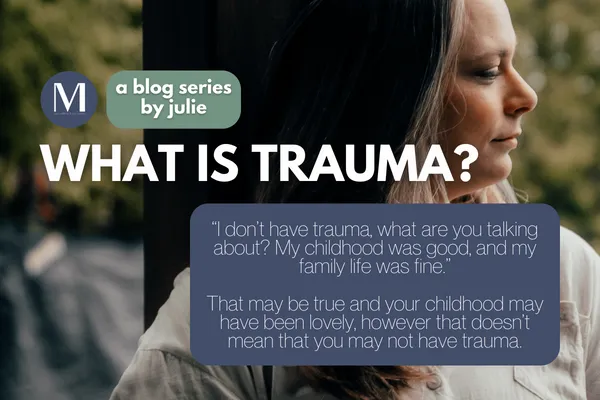the blog
A place for our team to share about topics they are passionate about, in hopes of allowing you to see and understand a bit more behind the faces on these pages.

What is Trauma?
You know when you’re in a situation and you get into a conflict with a boss, friend or partner and all of a sudden you’re spiraling? Your internal self-talk is super negative, you’re telling yourself that you’re a failure, a screw up, that you can’t do anything right. You start to either try to push the person away, and avoid them, disengage emotionally and numb out by work/media/socials/substances/shopping/food/etc. or you try to pursue the person trying desperately to connect and get reassurance that you’re ok and that the relationship is ok. Sometimes you may find that you have this underlying sense of dread, feeling like you’ll never measure up or you can get really angry very quick with the slightest perceived insult.
These can be trauma responses. Now, your first response might be “I don’t have trauma, what are you talking about? My childhood was good, and my family life was fine.” That may be true and your childhood may have been lovely, however that doesn’t mean that you may not have trauma.
There are two types of trauma: Omission and Commission.
Trauma that is an omission are things that should have been done, but were not. Trauma that is a commission is when things are done to you. Trauma at its core is when something happens (or doesn’t) and it’s too much, too fast, too long - without the support we need to process and feel safe in the situation. We can experience these things and if we don’t have the support to process and feel safe afterwards, it can become encoded in our brains, bodies and emotions as a traumatic experience. Sometimes we may experience these things and have someone to support us and help us process through it. When that happens, it often doesn’t become encoded because there is still a sense of safety, security and connection throughout the experience and aftermath.
Now that we’ve explored just the beginning of what trauma is, I want you to reflect for a moment. What is your first internal response to this idea of trauma? What types of self-talk do you have? When you think about conflict or challenges in relationships, what is your initial response? And lastly, now that you may be more aware of these things, who is someone in your life that you feel emotionally safe with that you can start talking to?
Office Location: 1200 Brock Street South, Whitby, ON. L1N 4L9
© Marquis Counselling & Consulting | ALL RIGHTS RESERVED | TERMS & CONDITIONS | PRIVACY POLICY

